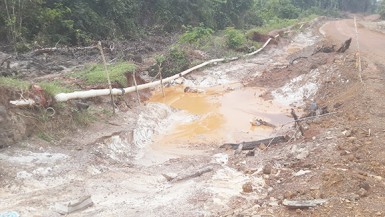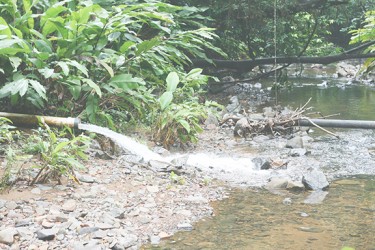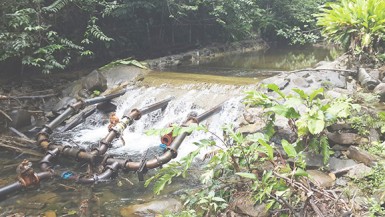Mahdia, (Potaro/ Siparuni) residents are now fully dependent on wells and purchasing tanks of water to meet all their needs as the pipes from the Salbora Falls reservoir have been disconnected and the road leading to the site demolished.
On a recent visit to the Region Eight township, Stabroek News was shown the now disconnected site of the reservoir in the mountains and the badly damaged road and trail left behind by illegal miners who excavated it in their operations, which would severely hamper efforts to service the site.
Residents are outraged that for more than two years there has been no consistent potable water supply to the area and that Regional Executive Officer (REO) Ronald Harsawack has shown little interest in addressing this issue. While the connection has now been completely cut off from the reservoir, residents said even when there was connected it did not serve the entire community, only the administrative section of Mahdia. When Stabroek News spoke with Harsawack, he said the issue had to be looked into.

According to Region Eight Chairman Mark Crawford, there had been inconsistent water supply since 2011, and there has been no supply for the year. Stabroek News also understands that it was only after the Regional Chairmanship was won by the Alliance For Change in the 2011 General Elections that a decision was taken to maintain water supply to the administrative section of Mahdia and divert supply from the main town to the Amerindian settlement of Campbell Town, a PPP/C stronghold.

AFC Councillor Mohamed Gafoor said he believed that the decision was politically motivated as Campbell Town had strong government ties. The Regional Democratic Council had raised the issue repeatedly with the REO’s office to no avail, he said. He also noted that no budget has been set to service the reservoir to ensure that it is always operational.
According to Gafoor, the Salbora Falls reservoir needs to be at least four feet high and since no steps had been taken in the last few years to maintain this depth, a decision was taken by the Assistant Regional Executive Officer to divert water away from the main or coast land areas of Mahdia. Further, he said, there has been no comprehensive assessment of the water situation and using well water or buying tanks of water has become a way of life for residents.

Meanwhile, road work along the Waterdog Road, the access road from Mahdia leading to North Fork, Region Seven, has exposed the pipeline which was supposed to have been buried six feet deep. It was clear that in many areas this was not done. Several sections of the pipeline are supported by ropes and appear to be cracked or broken. This newspaper understands that when the pipe was connected to the reservoir it would break often from the intense water pressure because it had not been properly buried or anchored.
“No water comes through the pipe,” APNU Councillor Oswald Junor told Stabroek News. He said a 450-gallon black tank of water costs $5000 dollars and if persons elected to dig wells, the regional administration would charge a tax. He is frustrated that as a member of the Public Works Committee councillors are seemingly left out of the decision-making and monitoring processes.
Mahdia has repeatedly had potable water challenges. In recent years residents have complained that miners have disrupted the water supply either by tapping into it illegally to use for dredging or by damaging the pipelines through illegal excavation along the road.








